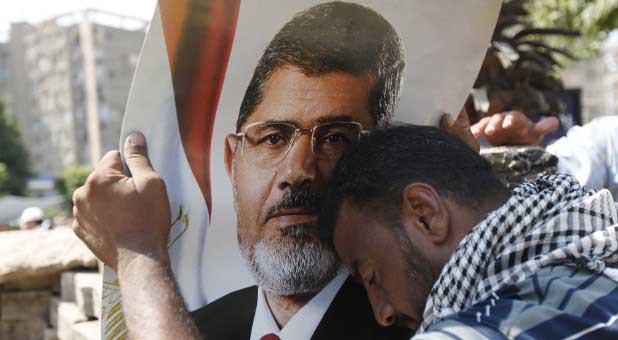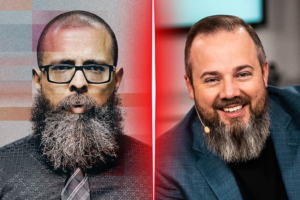Critics who call the recent coup by the Egyptian army “undemocratic” are placing form over substance and forgetting that the election of Mohammed Morsi was itself arguably undemocratic.
Because his Muslim Brotherhood party was the only organized political force running for office, there was little chance of meaningful political competition emerging in the mere six months between Hosni Mubarak’s overthrow and Egypt’s first free elections. That fact might have mattered much less had Morsi used his presidency to promote individual freedoms and build democratic, power-sharing institutions.
But Morsi reverted to the same undemocratic policies he was elected to change. In effect, Morsi simply replaced a secular autocratic rule with an Islamist one.
Unsurprisingly, persecution of Egypt’s Christian minority worsened under Morsi. According to Mideast expert Raymond Ibrahim, “The persecution of Copts [was] practically legalized, as unprecedented numbers of Christians … [were] arrested, often receiving more than double the maximum prison sentence, under the accusation that they ‘blasphemed’ Islam and/or its prophet.
“It was also under Morsi’s reign that another unprecedented scandal occurred: the St. Mark Cathedral—holiest site of Coptic Christianity and headquarters to the Pope Tawadros himself—was besieged in broad daylight by Islamic rioters. When security came, they too joined in the attack on the cathedral. And the targeting of Christian children—for abduction, ransom, rape, and/or forced conversion—had also reached unprecedented levels under Morsi.”
Also under Morsi, the Egyptian currency lost more than a tenth of its value, making it harder for Egypt to import fuel and food. Morsi shunned the tough decisions needed to reform the Egyptian economy and gain the confidence of the International Monetary Fund and foreign investors. No economy has prospered because of Muslim Brotherhood leadership, and Morsi’s ties to the group almost guaranteed economic failure, given how bad Islamist policies are for beach tourism (which needs bikinis and beer).
Morsi’s Islamist leanings were also bad for non-beach tourism. Last month Morsi decided that the new governor of the ancient city of Luxor would be Adel Mohamed al-Khayat, a man with ties to the Islamist group that massacred around 60 tourists in that same tourist destination in 1997. That decision might have solidified Morsi’s political power, but how could it possibly have benefited Egypt?
In August 2012, when Morsi became the first Egyptian leader to host an Iranian president since the 1979 revolution imposed an Islamic theocracy on Iranians, what signal did that send to Egyptians (and the rest of the world)? When Morsi attended a June 15 rally packed with fellow Islamists calling for jihad in Syria, how could that possibly serve Egypt, which can barely stay afloat much less enter foreign wars?
With so little time to solve Egypt’s colossal problems, Morsi’s Islamist ineptitude quickly worsened virtually everything. To the credit of Egypt’s people (and army), they swiftly reclaimed the power they had given to Morsi before he could take them any further down a dangerous path that was all too familiar for its autocratic ways but far worse for its instability and rudderless economic descent.
As the most populous Arab state, Egypt’s single greatest challenge has for years been employing its population (now at 85 million). That problem intensified when tourism and foreign investment dropped precipitously after 2011, when the decades-long stability of Mubarak’s rule was replaced by the unknown. Unemployment for the first quarter of 2013 was an estimated 13.2 percent.
The country’s next leader—Adly Mansour, who was just sworn in as Egypt’s interim president, and whoever ultimately succeeds him—will need tremendous skill to restore the stability, security, tourism and investor confidence needed to revive the economy. Any leader facing this daunting challenge should also realize that without better family planning policies, the country’s chronic overpopulation will continue aggravating Egypt’s many related problems: poverty, pollution, overcrowding, power outages and illiteracy.
To help restore domestic peace and foreign confidence in Egypt’s commitment to religious freedom, full protection and equal treatment must be given to Egypt’s Christians—the largest religious minority and a vital and ancient part of Egypt. Given how important Copts are to the history of Christianity, their community and holy sites should be a source of Egyptian pride and can even help to revitalize Egyptian tourism by attracting Christian tourists, provided that the Copts’ legitimate political and security concerns are adequately addressed.
The taboo of dealing with Israel should also be overcome, if only for the economic benefits that could result. Israel’s successful transition from an agricultural, low-tech economy to one based on entrepreneurial innovation can provide some guidance/inspiration and opportunities for joint ventures in tourism, textiles, clean tech and other sectors.
Scandalous as it may seem to Egyptians, their northern neighbor’s 65-year democracy may even have some useful experience with separating religion and state, keeping the peace among an ethnically and religiously diverse population, protecting individual liberties and developing democratic and power-sharing institutions. But to realize the full potential of the 1979 treaty, Egypt’s media and politicians must start treating the Israeli-Egyptian peace as a blessing rather than a curse.
Unfortunately, Egypt’s recent coup establishes a problematic precedent for checking presidential power: militarily topple the president before his second year in office. Egypt’s problems are so deep and numerous that even the best leader will probably disappoint “the street” one year into office. But some historical perspective may be useful here: The French Revolution was sparked by a fiscal crisis and demands for individual liberties that ultimately overthrew the absolute monarchy that had ruled France for centuries. That revolution involved about a decade of turmoil and killed tens of thousands before Napolean Bonaparte assumed power in 1799. Fixing Egypt could be a long and bumpy road, but at least the repairs have started.
Noah Beck is the author of The Last Israelis, an apocalyptic novel about Iranian nukes and current geopolitical issues in the Middle East.
See an error in this article?
To contact us or to submit an article
























